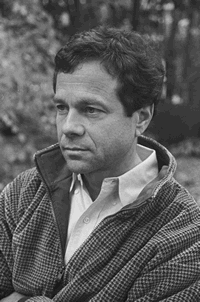June 27, 2012 A Memphis native known for both literature (he’s a novelist, poet, and essayist) and science (he’s a physics professor at MIT), Alan Lightman has a penchant for tackling tough philosophical questions, and his new book, Mr g: A Novel About the Creation. is no exception. A mythical novel that tells the story of the universe and of God’s—a.k.a. Mr g’s—hand in its creation, the book addresses some hotly-debated questions about the nature of a creator god.
Lightman recently contributed two essays to the Memphis Commercial Appeal about a similar scientific debate, one that concerns the struggle between faith and reason. In the first essay, Lightman writes:
I am a scientist. For most of my life, I have lived with the dictates of science: the physical world operates according to rational and mathematical laws, all phenomena have physical causes, all hypotheses must be tested against experiment. Yet I also believe there are things we take on faith, without physical proof and even sometimes without any methodology for proof. We cannot clearly show why the ending of a particular novel haunts us. We cannot prove under what conditions we would sacrifice our own life in order to save the life of our child. We cannot prove whether it is right or wrong to steal in order to feed our family, or even agree on a definition of “right” and “wrong.” We cannot prove the meaning of our life, or whether life has any meaning at all.
Lightman’s second essay for the Commerical Appeal considers some of the same questions, this time within the context of a new Tennessee law that permits teachers and students to question the validity of scientific theories commonly presented in science textbooks as accepted truth. As in the earlier essay, Lightman’s responds to the legislation by reflecting on the different ways science and religion approach truth:

It is sometimes useful to distinguish between a physical universe and a spiritual universe, with the physical universe being the constellation of all physical matter and energy that scientists study, and the spiritual universe being the “unseen order” that [philosopher William] James refers to, the territory of religion, the nonmaterial and eternal things that most humans have believed throughout the ages.
Lightman’s willingness to tackle and discuss these challenging questions extends far beyond his hometown newspaper. In fact, the publication of Mr. g earlier this year has provide several opportunities to make such comments to the national media. When The Atlantic asked about the origin of the novel, Lightman offered more than one answer: “I have always loved magic realism as a form of writing. I have also been fascinated for a long time with the intersection of science and religion. And finally, I am a fan of Italo Calvino’s Cosmicomics, which portrays a group of celestial beings who, even though powerful, are willing to deal with the mundane affairs of mortal beings.”
In discussing the process of writing the novel itself, Lightman told CBS News, “God is the narrator and tells the story in the first person. After living with the voice of God for the year that I worked on the book, with the power to create time and space, matter and energy, animate matter and consciousness, now and then I had tiny flashes of what it feels like to be all powerful. I had not expected this feeling, but I always try to inhabit the minds and bodies of the characters I create, and in this case I was attempting to imagine what it would be like to be God—in a literary sense of course.”
An interview with The Toronto Star brought him back to questions of reason and faith: “Religion and science have their own domains of validity, and both are very important forces that have shaped civilization. But one won’t outlast or refute the other. As a scientist, I don’t believe science will ever discover whether God exists. Nor do I believe religion will ever prove it.”
As expected, the critical response to such a potentially controversial book have been mixed, but many reviewers cited the boldness and creativity of Mr g:
The Vancouver Sun noted, “Lightman, a theoretical physicist as well as a novelist (and a teacher of both), has, in Mr g (note the lower case), created not just a fascinating and oddly moving novel, but an entire genre: call it cosmological scientism. Or scientific cosmology. The exact term doesn’t matter: what’s significant is that there’s nothing else like it.”
The Brooklyn Rail said, “Alan Lightman’s Mr g is a brilliant philosophical play on creation told through the eyes of God himself.”
The Washington Times book review concluded, “What we have here is not only good writing, but also, Mr. Lightman assures the reader, good science. That combination may be enough to make students, and their, ah, material antecedents, actually enjoy science.”
Dallas News added, “Like he did to great acclaim in Einstein’s Dreams, Lightman here offers a pleasing mix of science and philosophy. … [He] manages heavy topics with a light, often comic tone, all while conveying a sense of wonder usually reserved for believers.”
Various publications have also included Mr g in their lists of must-read books, including both Publishers Weekly and the Wall Street Journal, among others.
Click here to read Chapter 16’s review of Mr g, here to read Chapter 16’s profile of Lightman, and here to read an excerpt from Lightman’s forthcoming memoir about growing up in Memphis.





